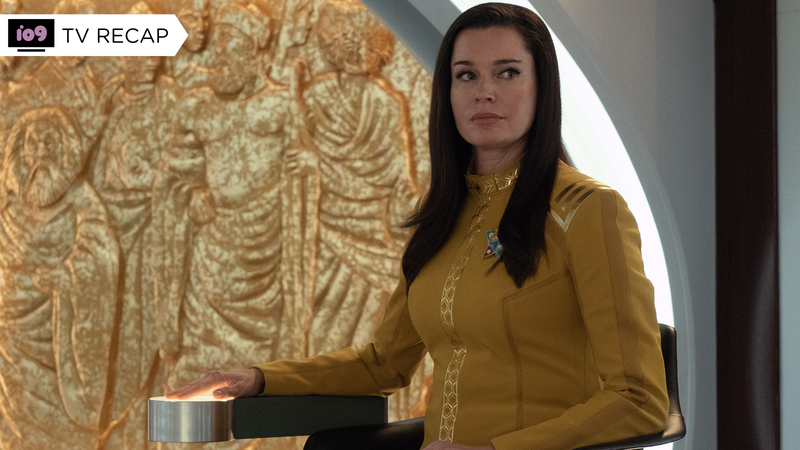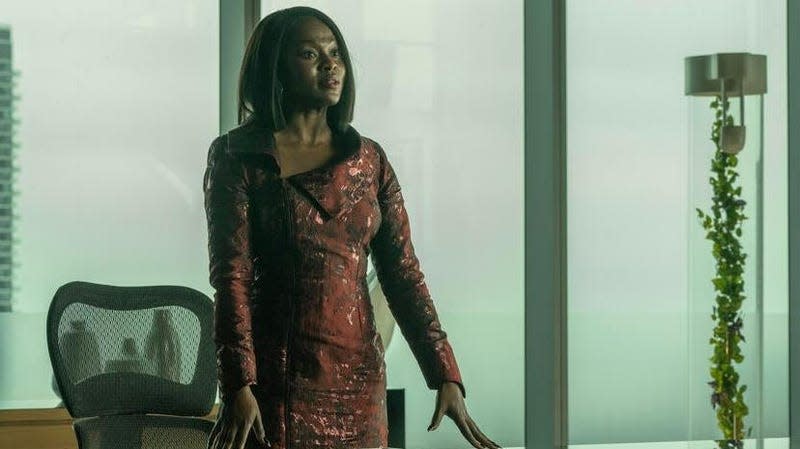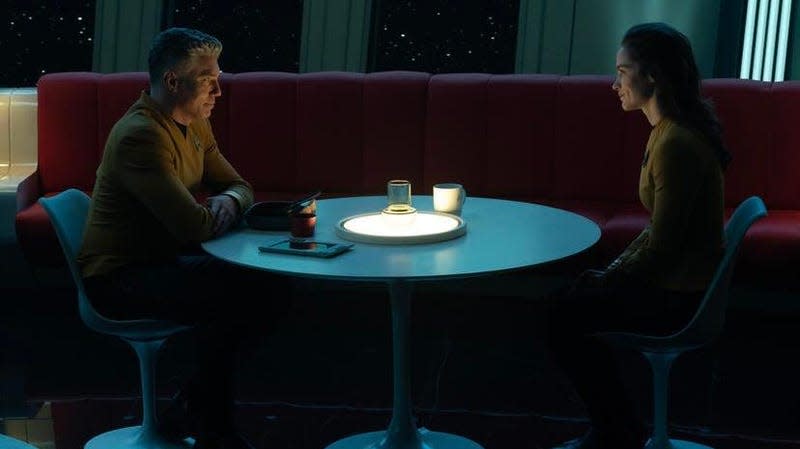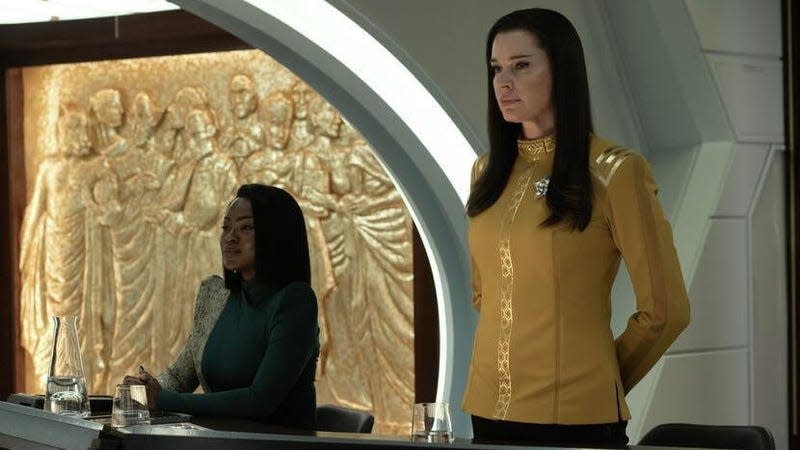Star Trek: Strange New Worlds' Day in Court Gets by on a Technicality

There simply comes a time when a Star Trek show demands a courtroom episode. Whether it’s internal Starfleet politics, or the chance to advocate Federation ideals to an alien society, Star Trek loves an opportunity to make its subtexts so text it can practically beat a book of them over your head. And so it’s no surprise Strange New Worlds already finds itself at this crossroads of exploring the franchise’s classic tropes.

“Ad Astra per Aspera” picks up on the climactic twist of season one’s ending, where Number One (Rebecca Romijn), also known as Una Chin-Riley, was arrested by Captain Batel (returning guest star Melanie Scrofano) for hiding from Starfleet that she is actually an Illyrian—a genetically modified species whose cultural practice of adapting their bodies to the worlds they colonize goes against the Federation’s strict laws against genetic enhancement in the wake of the cataclysmic Eugenics Wars.
Read more
After Captain Pike (Anson Mount) took a break from last week’s “steal my own starship” hijinks, we catch up with him visiting an Illyrian colony world to try and help Commander Una’s case go as smoothly as it can. In the perfect Star Trek courtroom episode contrivance, Una happens to have an old Illyrian friend who is now a stellar intergalactic civil rights lawyer. Even though they have a rough past together, the lawyer—Neera, played in a superstar firebrand turn by American Gods’ Yetide Badaki—agrees to take on the case. Not because she particularly cares for Pike or Una at this point, but because Neera believes she can make the case not just about Una, but against the Federation at large for its discrimination against genetically altered species.

This is Strange New Worlds’ one great twist on the classic Trek courtroom format: the advocate for Star Trek’s ideals is not the captain, or a Federation officer, but a member of the same marginalized group being put on trial. Many of Trek’s past courtroom dramas have often been predicated on a marginalized person’s rights—a Starfleet officer’s or otherwise—being put on trial, and the only way to protect those rights is to have someone who is not of that marginalized group come in and educate the courtroom as to otherwise, and sometimes even to other members of that same marginalized group. This often works in Trek’s favor, because we like its heroes, and we like them a lot when they get big acting soliloquy moments where they get to triumphantly champion Star Trek’s faith in equality and empathy for all, and we conveniently forget the fact that the person on trial in these moments just has to sit there and watch as their rights are advocated for.
In fact, “Ad Astra per Aspera” explicitly goes out of its way to remind us that a big fancy speech from Pike would actually be the worst thing he could do help Una’s case, when Batel—who is, to make all the interconnected relationships here even more tangled, Pike’s girlfriend—reminds him that the moment he takes the stand any speech is going to be interrupted, interrupted by her, with the simple question that would kill his career: how long did he know Una was an Illyrian? His personal pride in his First Officer or his penchant for charming wordplay, the very things we would typically see as strengths to the case in past episodes like this, are immediately rendered impotent, and it’s up to Neera to take on those things, as well as her own goals for the case and her troubled past with Una, and synthesize them into a win.

It makes the allegory at the heart of “Ad Astra per Aspera,” which could have in clumsier framings come off as a parallel to racial prejudice where a white woman is on trial, much stronger, and Neera’s arguments to the court—which open with a double-barreled assault on the Federation itself before softening into something more nuanced as the proceedings continue—are made more powerful because she is talking from the same perspective and experiences as her client. As her argument and Una’s revelations about their past push things to be more about the privilege of who can and cannot publicly pass as an Illyrian (Una reveals that in her childhood, her family managed to avoid persecution by leaving the segregated side of her home city to live among humans, leaving Neera and visibly-altered Illyrians behind), and what Una wants to do with that privilege, the social commentary parallels push Strange New Worlds’ riff on the courtroom episode into the present, drawing on the current moment around things like LGBTQ+ rights and the ongoing federal persecution of trans people across America.
Crucially Neera and Una begin working in tandem in advocating for changes within Federation law through their shared background and experiences, so not only does Star Trek get to metaphorically beat you about the head with what its subtext has always been, it gets to do so from the two-pronged approach of marginalized people from within and without the Starfleet apparatus. And, of course, it’s going to have that defense work, because it’s Star Trek and it wants to remind you that it’s always been about power of infinite diversity in infinite combinations... even if what actually gets Una out of prison is Neera niftily whipping out a literal book of Starfleet rules and finding a technicality to turn Pike’s hiding of Una’s Illyrian background into an asylum case, instead of a violation against the rules about augmented peoples.

But for as good as this all is—and once again is brilliantly anchored in Badaki’s performance as Neera, every bit in the footsteps of Patrick Stewart in “Measure of a Man” or Avery Brooks in “Dax”—there is something structural to Star Trek itself that has to render this victory as pyrrhic as it is inevitable. We know Una has to avoid being kicked out of Starfleet, because we know she’s going to be First Officer of the Enterprise for a good while yet. We also know that the Federation’s laws on genetic modification won’t change in the way Neera wants them to. That’s just Star Trek canon at work—there’s no tension on whether or not the case will go in Una’s favor, because it has to. And so for all the barnstorming speechery and championing of empathetic quality we get on display here, things have to end with what is essentially the same unspoken problem of most Star Trek courtroom episodes: our heroes get by on the victory in the moment, but the bigger picture of the rights they championed in the victory are put aside to not be touched again.
It’s a dampener, yes, but not one potent enough to undercut that “Ad Astra per Aspera” is largely a smart, timely evolution on a hallmark Trek episode format, in the style that Strange New Worlds has found itself excelling at so far. But at the very least, it is—as Neera says herself, escorting Una back aboard the Enterprise to be reunited with her friends—a good step in the right direction, if not a full-throated victory.
Want more io9 news? Check out when to expect the latest Marvel, Star Wars, and Star Trek releases, what’s next for the DC Universe on film and TV, and everything you need to know about the future of Doctor Who.
More from Gizmodo
Sign up for Gizmodo's Newsletter. For the latest news, Facebook, Twitter and Instagram.

